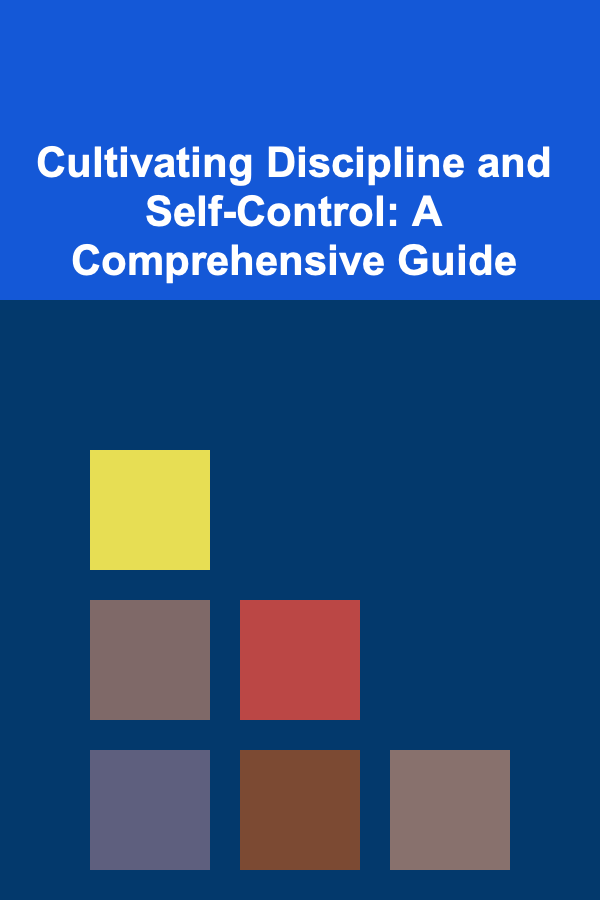
Cultivating Discipline and Self-Control: A Comprehensive Guide
ebook include PDF & Audio bundle (Micro Guide)
$12.99$11.99
Limited Time Offer! Order within the next:

Discipline and self-control are the cornerstones of personal growth, achievement, and overall well-being. They are the internal forces that allow us to resist impulsive desires, overcome obstacles, and consistently work towards our goals. In a world saturated with instant gratification and distractions, cultivating these virtues is more crucial than ever. This guide delves into the multifaceted nature of discipline and self-control, exploring their benefits, understanding the underlying psychology, and offering practical strategies to strengthen them in your own life.
The Profound Benefits of Discipline and Self-Control
The advantages of cultivating discipline and self-control extend far beyond simply achieving specific goals. They permeate every aspect of your life, fostering a sense of empowerment and improving your overall quality of life. Consider these key benefits:
- Goal Achievement: This is perhaps the most obvious benefit. Discipline provides the unwavering focus and perseverance needed to overcome challenges and consistently work towards your aspirations, whether they involve career advancement, academic success, or personal development.
- Improved Health and Well-being: Self-control empowers you to make healthier choices, resisting unhealthy cravings, maintaining a regular exercise routine, and prioritizing sufficient sleep. This leads to improved physical and mental health, reduced stress, and increased longevity.
- Enhanced Productivity and Efficiency: Discipline helps you manage your time effectively, prioritize tasks, and avoid procrastination. This results in increased productivity, allowing you to accomplish more in less time and reduce feelings of overwhelm.
- Stronger Relationships: Self-control enables you to respond to others with patience, empathy, and understanding, even in challenging situations. It fosters better communication, reduces conflict, and strengthens your relationships with family, friends, and colleagues.
- Greater Financial Stability: Disciplined spending habits, coupled with the ability to resist impulsive purchases, contribute to improved financial stability. Self-control allows you to save money, invest wisely, and achieve your financial goals.
- Increased Confidence and Self-Esteem: Successfully overcoming challenges and achieving your goals through discipline builds confidence and self-esteem. Each act of self-control reinforces the belief in your ability to manage your life and achieve your desired outcomes.
- Reduced Stress and Anxiety: By taking control of your life and making conscious choices, you reduce feelings of helplessness and anxiety. Discipline creates a sense of order and predictability, leading to greater inner peace.
- Improved Decision-Making: Self-control allows you to make rational decisions based on long-term goals rather than succumbing to immediate impulses. This leads to better choices in all areas of your life, from career paths to personal relationships.
- Enhanced Emotional Regulation: Discipline allows you to manage your emotions more effectively, preventing impulsive reactions and promoting mindful responses. This contributes to greater emotional stability and resilience.
Understanding the Psychology of Discipline and Self-Control
To effectively cultivate discipline and self-control, it's essential to understand the psychological mechanisms that underpin these qualities. Several key theories and concepts shed light on the inner workings of self-regulation:
1. Ego Depletion Theory
This theory, proposed by Roy Baumeister, suggests that self-control is a finite resource. Each act of self-control depletes this resource, making it more difficult to resist temptations in subsequent situations. Think of it like a muscle: the more you use it, the more fatigued it becomes. However, consistent practice of self-control can, over time, strengthen this "muscle."
Implications:
- Be mindful of your energy levels. Avoid making important decisions or engaging in challenging tasks when you are feeling mentally fatigued.
- Prioritize self-care activities, such as getting enough sleep, eating nutritious foods, and engaging in stress-reducing activities, to replenish your self-control resources.
- Structure your day to minimize temptation and reduce the need for constant self-control.
2. Cognitive Behavioral Therapy (CBT)
CBT emphasizes the role of thoughts, feelings, and behaviors in shaping our actions. It suggests that by identifying and modifying negative thought patterns and developing coping mechanisms, we can improve our self-control.
Implications:
- Become aware of the thoughts and feelings that trigger impulsive behaviors.
- Challenge negative or irrational thoughts, replacing them with more realistic and positive ones.
- Develop coping strategies for managing urges and temptations, such as distraction, relaxation techniques, or seeking support from others.
3. Self-Determination Theory (SDT)
SDT emphasizes the importance of autonomy, competence, and relatedness in motivating behavior. When we feel a sense of control over our choices, a sense of mastery over our skills, and a sense of connection with others, we are more likely to be intrinsically motivated and disciplined.
Implications:
- Set goals that are personally meaningful and aligned with your values.
- Break down large goals into smaller, more manageable steps to build a sense of competence and achievement.
- Seek support from friends, family, or mentors who can provide encouragement and accountability.
4. The Power of Habit
Habits are automatic behaviors that are triggered by specific cues. By consciously creating positive habits, we can automate desired behaviors and reduce the need for constant willpower. Understanding the habit loop (cue, routine, reward) is crucial for building and breaking habits.
Implications:
- Identify the cues that trigger undesirable behaviors and modify or eliminate those cues.
- Replace negative habits with positive ones that serve your goals.
- Reward yourself for engaging in desired behaviors to reinforce the habit loop.
5. Mindfulness and Meditation
Mindfulness involves paying attention to the present moment without judgment. Meditation is a practice that cultivates mindfulness. By practicing mindfulness, we can become more aware of our thoughts, feelings, and urges, allowing us to respond more consciously rather than react impulsively.
Implications:
- Practice mindfulness meditation regularly to develop your awareness and emotional regulation skills.
- Use mindfulness techniques to observe your thoughts and feelings without judgment when faced with temptations.
- Focus on your breath or engage your senses to anchor yourself in the present moment.
Practical Strategies for Cultivating Discipline and Self-Control
Building discipline and self-control is an ongoing process that requires conscious effort and consistent practice. Here are several practical strategies you can implement in your life:
1. Set Clear and Specific Goals
Vague or abstract goals are difficult to achieve. Instead of saying "I want to be healthier," specify "I want to lose 10 pounds in the next three months by exercising three times a week and eating a balanced diet." The more specific your goals, the easier it will be to create a plan and track your progress.
- Use the SMART criteria for goal setting: S pecific, M easurable, A chievable, R elevant, and Time-bound.
- Write down your goals and keep them visible as a constant reminder.
- Break down large goals into smaller, more manageable steps.
2. Create a Detailed Plan of Action
Once you have set your goals, create a detailed plan outlining the steps you will take to achieve them. This plan should include specific actions, timelines, and potential obstacles.
- Identify the resources you will need to achieve your goals.
- Anticipate potential challenges and develop strategies to overcome them.
- Schedule your activities and tasks in a planner or calendar.
3. Establish a Routine and Stick to It
Routines create structure and predictability in your life, reducing the need for constant decision-making and willpower. Establish a daily and weekly routine that incorporates your goals and priorities.
- Start with small, achievable routines and gradually build upon them.
- Be consistent with your routines, even on weekends or when you don't feel like it.
- Allow for flexibility and adjust your routines as needed.
4. Minimize Temptation and Distractions
Reduce your exposure to tempting situations or distractions that can derail your progress. This might involve limiting your access to social media, avoiding certain places or people, or creating a dedicated workspace.
- Identify your triggers and develop strategies to avoid them.
- Create a supportive environment that promotes your goals.
- Use technology to block distractions and manage your time effectively.
5. Practice Delaying Gratification
Delaying gratification is a key component of self-control. Practice resisting immediate impulses in favor of long-term rewards. This could involve waiting to eat a treat, postponing a purchase, or delaying a pleasurable activity until you have completed your work.
- Start with small delays and gradually increase the duration.
- Focus on the long-term benefits of delaying gratification.
- Reward yourself for successfully resisting temptation.
6. Cultivate Self-Awareness
Pay attention to your thoughts, feelings, and behaviors. Identify the patterns and triggers that lead to impulsive actions or a lack of discipline. Journaling, meditation, and mindfulness practices can help you cultivate self-awareness.
- Reflect on your experiences and identify areas where you struggle with self-control.
- Track your progress and identify any setbacks or challenges.
- Seek feedback from trusted friends or mentors.
7. Practice Self-Compassion
Be kind to yourself when you make mistakes or experience setbacks. Self-compassion involves treating yourself with the same kindness and understanding that you would offer to a friend. It helps you avoid negative self-talk and stay motivated.
- Recognize that everyone makes mistakes and that setbacks are a normal part of the process.
- Challenge negative self-talk and replace it with positive affirmations.
- Focus on your strengths and celebrate your accomplishments.
8. Seek Support and Accountability
Surround yourself with people who support your goals and hold you accountable for your actions. This could involve joining a support group, working with a coach or mentor, or simply sharing your goals with friends and family.
- Find a buddy who shares your goals and can provide encouragement and accountability.
- Join a community or online forum where you can connect with like-minded individuals.
- Seek professional help if you are struggling to cultivate discipline and self-control on your own.
9. Visualize Success
Mental rehearsal can be a powerful tool for building confidence and motivation. Visualize yourself successfully achieving your goals and overcoming obstacles. Imagine the positive feelings and rewards that will result from your efforts.
- Find a quiet place where you can relax and focus on your visualization.
- Engage all of your senses to make the visualization as vivid as possible.
- Repeat the visualization regularly to reinforce your goals and motivations.
10. Celebrate Your Progress and Reward Yourself
Acknowledge your achievements and reward yourself for making progress towards your goals. This helps to reinforce positive behaviors and maintain your motivation. Choose rewards that are healthy and aligned with your long-term goals.
- Keep track of your accomplishments and celebrate milestones.
- Reward yourself for achieving small goals as well as large ones.
- Choose rewards that are meaningful and enjoyable.
Long-Term Sustainability: Making Discipline a Lifestyle
Cultivating discipline and self-control is not a one-time fix, but rather an ongoing journey of self-improvement. To ensure long-term sustainability, consider the following:
1. Embrace a Growth Mindset
A growth mindset is the belief that your abilities and intelligence can be developed through dedication and hard work. Embrace challenges as opportunities for growth and learning. View setbacks as temporary and learn from your mistakes.
2. Continuously Learn and Adapt
Stay informed about the latest research on self-control and discipline. Be willing to experiment with different strategies and adapt your approach as needed. What works for one person may not work for another, so it's important to find what works best for you.
3. Prioritize Self-Care
Self-care is essential for maintaining your mental and physical well-being. Make time for activities that you enjoy and that help you to relax and recharge. Prioritize sleep, nutrition, and exercise.
4. Cultivate Patience and Persistence
Building discipline and self-control takes time and effort. Don't get discouraged if you don't see results immediately. Be patient with yourself and persistent in your efforts. Remember that even small improvements can make a big difference over time.
5. Integrate Discipline into Your Identity
Strive to make discipline and self-control a core part of your identity. See yourself as a disciplined and self-controlled person. This will make it easier to consistently act in accordance with your values and goals.
Conclusion
Cultivating discipline and self-control is a lifelong journey that requires dedication, effort, and self-compassion. By understanding the underlying psychology, implementing practical strategies, and prioritizing self-care, you can strengthen your inner resolve and unlock your full potential. The rewards of a disciplined life are immeasurable, leading to greater success, happiness, and overall well-being. Embrace the challenge, be patient with yourself, and celebrate your progress along the way. The journey to self-mastery is a journey worth taking.

How to Build a Checklist for Preparing Healthy Lunches for School
Read More
How to Make Your Bed a Space-Saving Solution
Read More
How to Renovate Your Home's Flooring Without Breaking the Bank
Read More
How to Save Space in Your Bathroom with Over-the-Door Storage
Read More
Finding Books That Are Both Humorous and Profound
Read More
Adapting to Different Paces of Life: A Deep Dive
Read MoreOther Products

How to Build a Checklist for Preparing Healthy Lunches for School
Read More
How to Make Your Bed a Space-Saving Solution
Read More
How to Renovate Your Home's Flooring Without Breaking the Bank
Read More
How to Save Space in Your Bathroom with Over-the-Door Storage
Read More
Finding Books That Are Both Humorous and Profound
Read More